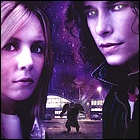 The Doctor tries to get Lucie back to her own time, but lands in 1974 in the middle of the Glam Rock fad. On a wintery night, they find themselves holed up in a diner with a variety of music-business types, including a manager and his up-and-coming young brother/sister act, Trisha and Tommy Tomorrow. But there’s also a never-was ex-singer with an odd connection to Lucie. And who are “The Only Ones”? And what do they want from Tommy Tomorrow?
The Doctor tries to get Lucie back to her own time, but lands in 1974 in the middle of the Glam Rock fad. On a wintery night, they find themselves holed up in a diner with a variety of music-business types, including a manager and his up-and-coming young brother/sister act, Trisha and Tommy Tomorrow. But there’s also a never-was ex-singer with an odd connection to Lucie. And who are “The Only Ones”? And what do they want from Tommy Tomorrow?
written by Paul Magrs
directed by Nicholas Briggs
music by Tim SuttonCast: Paul McGann (The Doctor), Sheridan Smith (Lucie Miller), Bernard Cribbins (Arnold Korns), Una Stubbs (Flo), Stephen Gately (Tommy Tomorrow), Clare Buckfield (Trisha Tomorrow), Lindsay Hardwick (Pat), Katarina Olsson (Headhunter)
Notes: Bernard Cribbins previously portrayed Tom Campbell, the storyline replacement for Ian Chesterton, in the second Doctor Who theatrical film, Daleks – Invasion Earth 2150 AD. The title of this story is a play on The Horror Of Fang Rock, a popular Fourth Doctor story.
Timeline: after Blood Of The Daleks Part 2 and before Immortal Beloved
LogBook entry & review by Philip R. Frey
Review: Stories like Horror of Glam Rock are nothing new. Tales of aliens communicating through music (for good or nefarious resaons) are about as old as the genre itself. But if it’s not exactly original, at least it’s handled well.
The characters are well defined, particularly Arnold and Pat. They both have more layers to them than it would seem from their first appearance, although Pat proves to be little more than an excuse for exposition in her interactions with Lucie. Tommy and Trisha are a bit too simplistic, but serve their purpose in the story.
Where writer Magrs really shines is in some crackling good dialogue that rings true for the time period, not just throwing in the odd reference or phrase. Too often with these kinds of stories, the  characters are just modern day people with old slang. But here, they really seem to have 1970s attitudes as well as vernacular.
characters are just modern day people with old slang. But here, they really seem to have 1970s attitudes as well as vernacular.
In keeping with the title, there’s some real horror in this one, too, with people being literally ripped to shreds in some cases. While it’s not actually frightening, it is vividly portrayed and helps amp up the tension.
The Doctor and Lucie seem to be getting along better (not unlike many a classic companion who went from antagonist to friend in short order), and the actors are obviously at ease with each other. But the continued “headhunter” bit (the woman who’s been chsing after Lucie for three episodes) is getting old. It seems so slapped on, I can’t help but think it’s got very little chance of justifying the build-up.
Lastly, the music, like the dialogue, really evokes the times. The central song, “Children of Tomorrow” has an authentic feel to it that helps make the setting work. Music can often help anchor a story and, given how central it is to the theme, it’s not surprising that it serves that purpose here. Luckily, the music is not only authentic enough to fit, it’s also good enough not to get on one’s nerves.
So, a decent story and, unlike a lot of Doctor Who audio, one I’m okay with listening to over and over again. So far, the BBC7 series has been all I could hope for. Now here’s hoping it can eventually exceed my expectations.
